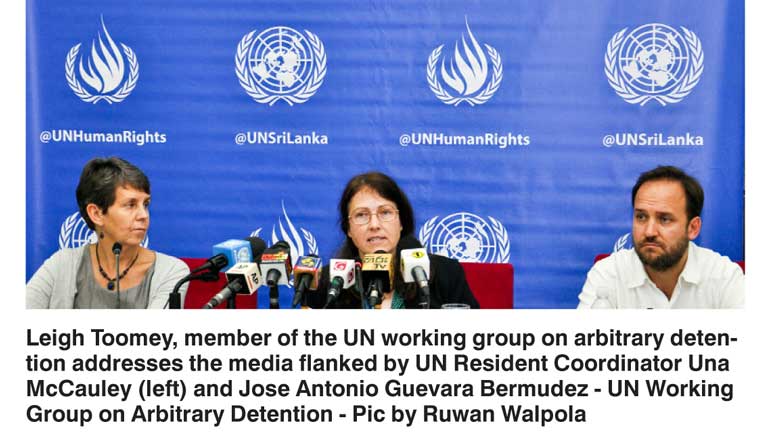Sunday Feb 22, 2026
Sunday Feb 22, 2026
Saturday, 16 December 2017 00:40 - - {{hitsCtrl.values.hits}}

By Chathuri Dissanayake
The UN Working Group on Arbitrary Detention yesterday urged the Government to establish independent monitoring bodies and improve mechanisms including practices set in place to prevent arbitrary arrest stressing the need for reforms in systems followed by the Police Commission in following up on complaints on torture during detention.
“We carried out discussions with the officials of the Police Commission and we feel that mechanisms in place to investigate complaints received by the Police Commission should be improved and strengthened,” member of the working group José Guevara said.
Ending a two week visit in the country, the three member delegation said there was an urgent need to give effect to Sri Lanka’s obligations under international human rights law, as well as the commitments made by the Government in its Human Rights National Action Plan 2017-2021.
“The right to personal liberty has yet to be respected by law enforcement, security forces, judicial and other authorities,” the experts said in a statement, after a three-member delegation carried out an official visit to the country.
The Working Group urged the repeal of number of outdated and discriminatory laws including the Vagrants Ordinance of 1841 and the House of Detention of 1907, stressing that the laws significantly curtail personal liberty of individuals.
In particular, the Working Group urged the Government of Sri Lanka to repeal the Prevention of Terrorism Act of 1979, as one of the key enablers of arbitrary detention for over four decades, the statement also said. The group stressed that any new legislation must be in accordance with international human rights law and best practices.
The delegation has visited a number of detention facilities, police stations and spoken to 100 victims during the mission. Pointing out that the authorities deny individuals of their liberty extended across a range of facilities, the UN delegation called for urgent reforms to address problems including the excessive use of remand, a lack of effective alternatives to detention, an outdated legal framework and reliance on confessions, often extracted under torture or duress.
The statement released by the group also said that “court proceedings were affected by excessive and unjustified delays, while suspects remained in detention indefinitely”, adding that the rights to the presumption of innocence and due process had yet to be fully recognised.
The delegation highlighted that detainees in general did not enjoy some of the most fundamental guarantees of due process, such as immediate access to legal assistance from the moment of the arrest and before their initial statement was recorded.
The Working Group also paid particular attention to the deprivation of liberty of those in situations of vulnerability, such as children, women, elderly people, those with psychosocial disabilities, and those living in poverty.
“Despite identifying positive practices in this regard, it is concerning that the legal basis and procedures for depriving people of their liberty are not clearly established,” the experts said.
“There are no effective safeguards against arbitrariness in this context and there is an urgent need to strengthen mechanisms for independent monitoring and oversight,” the group urged the Government.
The delegation was composed of Working Group members José Antonio Guevara Bermúdez, Leigh Toomey and Elina Steinerte, supported by staff from the UN Human Rights Office.
The Working Group will present the final report of its visit to the United Nations Human Rights Council in September 2018.